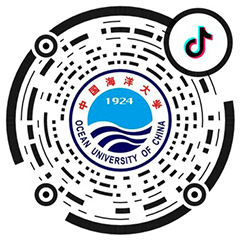
The 'firefighter' robots created by Guo Tingting and his team rehearse with the local fire brigade at an oil depot in Yantai, Shandong province, in 2019.
Guo Tingting has been developing his passion for robotics and invention, and today his creations are helping preserve life.
Nobody knew then that he would grow up to become an expert on machines, and after he enrolled into college, whenever he returned home during vacations, his neighbors would ask him to fix their electronics.

Guo introduces a robot to the judges at a startup contest for college students in 2014.
A career takes flight
Guo majored in electrical engineering and automation at Qingdao Agricultural University in 2010. He didn't have a clear direction until he took part in a water rocket competition in his freshman year at college. A water rocket is a ballistic model, typically made from plastic soda bottles, that uses water as its propellant.
The competition Guo entered scored the rockets based on the height they achieved and 'hang time', or how long they stayed airborne.
Guo studied the previous results of the competition and noticed that under the rules a breakthrough in height would be difficult, so he turned his focus on the duration it stayed there.
He added a parachute to the top of his design to prolong the landing time. The next challenge was to decide when and how to open the parachute. After several trials, he put a small firecracker on the rocket which would open the parachute and blow away the nose cone at the same time.
Guo used a remote controller to ignite the firecracker. The battery to charge the remote-control equipment was taken from his phone.
With this level of diligence and application, it's perhaps no surprise that his water rocket won first prize and he also snagged the award for creativity.
In 2011, Guo discovered his passion in the laboratory, where he had access to more than enough tools and pieces of specialist equipment to realize his creative ideas.
Since then, that's where he has spent most of his time and the effort has brought him many awards, scholarships, published papers and patents, including a national youth technology innovation award in 2014.
Guo is observant, and most of his inventions are inspired by the needs of everyday life.
He visited farmland around Shouguang in Shandong province as his social practice during his winter vacation in 2012. He noticed that the farmers expended a lot effort manually opening and closing the ceiling coverings of their greenhouses.

Guo displays a national youth technology innovation award.
So, upon returning to his beloved lab, he designed an automatic control system for the greenhouse coverings.
“The farmers can set the device to open the greenhouses' ceilings to soak up the sunshine and to close them when it rains,” Guo says.
He developed an alarm system to detect pear scab: Sensors can detect the temperature and humidity of the air and soil and can predict if conditions are ripe for the disease to thrive and notify the farmers.
He also invented a robot that can spray pesticides, before refining the design to be more precise with its spray and have less of an effect on the surrounding soil.
Conveniently designed
“Whether invention or perfection, the importance is to make one item or one machine that offers greater convenience,” he says.
Guo also invented a 'picking' robot to harvest tomatoes or strawberries. Two cameras on the robot serve as its eyes, helping the robot to 'see' the fruit, while a chip inside the machine acts as the 'brain'.
When the cameras collect the image and transfer it to the 'brain', the chip will analyze the image, calculate the location and initiate the picking procedure.
A mechanical arm equipped with a pair of scissors will extend toward the fruit and gently cut it from the branch.
Li Lin, a graduate student in the same lab with Guo at the Ocean University of China, has known him since 2014 when Guo was invited to give a speech as a university alumnus at the opening ceremony of her bachelor's study.
“I still remember his advice was: Go to the lab as soon as possible, which I did,” Li recalls.
“Working in a lab offers access to cutting-edge technology and allows us to practice our operational and problem-solving abilities, as what we do in the lab has sometimes not been tried before.”

A fire detection robot made by Guo and his team.
Lin always sees Guo in the lab. 'Whether weekdays or weekends, he is there without fail and he often arrives earlier than us,' she says.
Guo founded a startup with two friends when he obtained his bachelor's degree. They were focusing on making laboratory equipment.
After spending about half a year developing his product, he found his ability to market it somewhat lacking. As a fresh graduate, a dearth of experience in managing a company swayed his decision to dissolve the business.
However, he never gave up on the idea of being an entrepreneur. In 2015, when he enrolled in the Ocean University of China for his master's study, an investor who learned about his 'picking' robot offered him an opportunity to start a business again.
He said yes, on the condition that, this time, all of his focus, research and invention would be on the robot itself, while everyday management and marketing affairs would be delegated to others.
His current project is developing a robot that can work in high-risk environments.
'An invention in the college lab is more of an academic endeavor, while commercial design and development requires a mature product for the market,' Guo says.
The latest fruit of Guo's labor is a 'firefighter' robot that can enter the scene of a fire to investigate, put out the fire and carry trapped people out.
'The robot can endure a high-risk environment, such as being surrounded by flammable gas and it can climb stairs and slopes at gradients over 30 degrees,' he says.
The robot has already been put through its paces by some fire brigades and Guo is currently updating the robot's functionality to detect fires at the scene of an emergency more comprehensively and extinguish the blaze more efficiently.

编辑:葛伟鹏
责任编辑:罗文文


